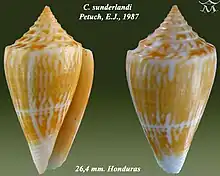| Conus sunderlandi | |
|---|---|
 | |
| Apertural and abapertural views of shell of Conus sunderlandi Petuch, E.J., 1987 | |
| Scientific classification | |
| Domain: | Eukaryota |
| Kingdom: | Animalia |
| Phylum: | Mollusca |
| Class: | Gastropoda |
| Subclass: | Caenogastropoda |
| Order: | Neogastropoda |
| Superfamily: | Conoidea |
| Family: | Conidae |
| Genus: | Conus |
| Species: | C. sunderlandi |
| Binomial name | |
| Conus sunderlandi Petuch, 1987 | |
| Synonyms[1] | |
| |
Conus sunderlandi is a species of sea snail, a marine gastropod mollusk in the family Conidae, the cone snails and their allies.[1]
Like all species within the genus Conus, these marine snails are predatory and venomous. They are capable of "stinging" humans, therefore live ones should be handled carefully or not at all.
Description
Original description: "Shell stocky, solid, broad across shoulder; shoulder sharp-angled; body whorl smooth and shiny; anterior tip with several strong spiral cords; shell color white, overlaid with numerous close-packed rows of tiny, bright orange, vertical flammules; mid-body with white band; anterior tip white, with few scattered tiny, orange flammules; bands of orange vertical flammules sometimes coalesce to form solid orange, wide band (as in paratypes shown in Figures 15, 16); spire whorls white, with numerous, closely-packed, bright orange, crescent-shaped flammules; interior of aperture pink; periostracum thin, smooth, yellow."[2]
Distribution
Locus typicus: "Off Utila Isl, Bay Islands, Honduras."[2]
This species occurs in the Caribbean Sea off Honduras.
Habitat
Minimum recorded depth is 18 m.[3] Maximum recorded depth is 18 m.[3]
References
- 1 2 Conus sunderlandi Petuch, 1987. Retrieved through: World Register of Marine Species on 27 March 2010.
- 1 2 Petuch, E.J. 1987-New Caribbean Molluscan Faunas, page 75. Publ: CERF
- 1 2 3 Welch J. J. (2010). "The "Island Rule" and Deep-Sea Gastropods: Re-Examining the Evidence". PLoS ONE 5(1): e8776. doi:10.1371/journal.pone.0008776.
- Tucker J.K. & Tenorio M.J. (2009) Systematic classification of Recent and fossil conoidean gastropods. Hackenheim: Conchbooks. 296 pp.
- Puillandre N., Duda T.F., Meyer C., Olivera B.M. & Bouchet P. (2015). One, four or 100 genera? A new classification of the cone snails. Journal of Molluscan Studies. 81: 1–23
External links
- The Conus Biodiversity website
- Cone Shells – Knights of the Sea
- "Gradiconus sunderlandi". Gastropods.com. Retrieved 16 January 2019.